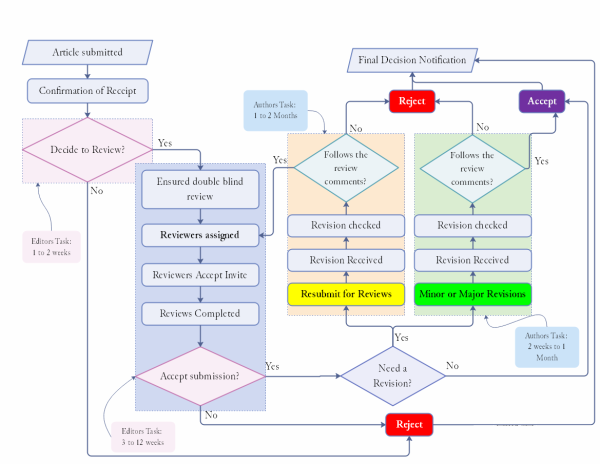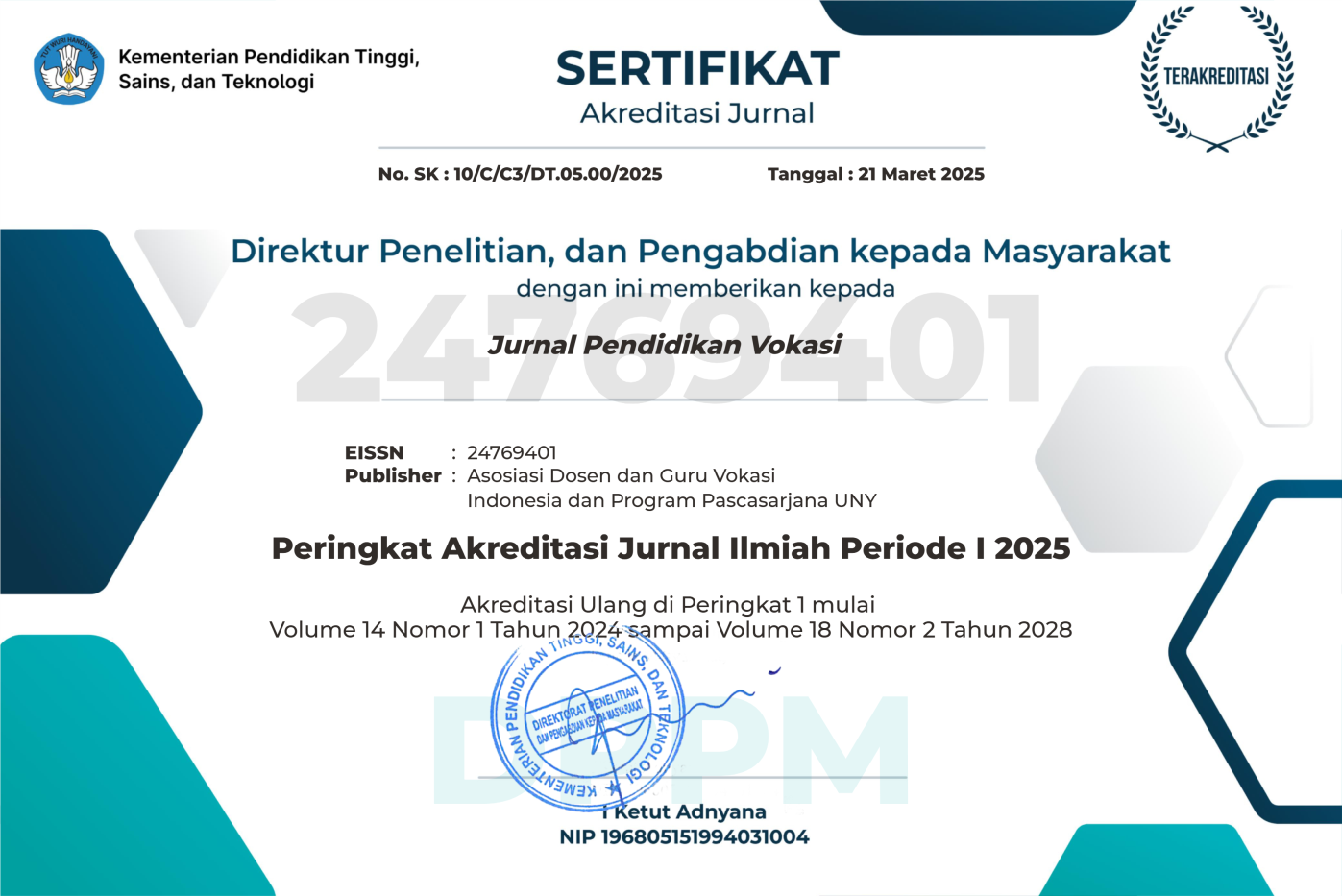About the Journal
 |
Print ISSN | 2088-2866 |
| Online ISSN | 2476-9401 | |
| DOI Prefix | 10.21831 | |
| Publisher | Graduate School of Universitas Negeri Yogyakarta in cooperation with Asosiasi Dosen dan Guru Vokasi Indonesia (ADGVI) (Memorandum of Understanding No. 3774/UN.34.17/PK/2011) | |
| Editor in Chief | Mochamad Bruri Triyono | |
| SINTA Score | 1 | |
| Frequency | 3 (Three) Issues per year | |
| Description | Jurnal Pendidikan Vokasi is published by Program Pascasarjana Universitas Negeri Yogyakarta or the Graduate School of Universitas Negeri Yogyakarta in cooperation with Asosiasi Dosen dan Guru Vokasi Indonesia (ADGVI) – Association of Vocational Lecturers and Teachers of Indonesia. The journal is aimed at publishing and disseminating the results of research and studies on vocational education conducted by researchers, teachers, and practitioners of vocational education and vocation. | |
| Focus & Scope | The scope of Jurnal Pendidikan Vokasi includes philosophy, curriculum, learning, evaluation, management, techonlogy, and policies on vocational education. In addition, studies on the global scope related to technology development research in the industry, technical and vocational education and training areas that become the object of the study can also be published in this journal. | |
| OAI Address | https://journal.uny.ac.id/index.php/jpv/oai | |
| Citation Analysis |
Focus and Scope
Jurnal Pendidikan Vokasi aims to be a leading platform for the dissemination of innovative and high-quality research in the field of vocational education. The journal focuses on the development of knowledge, theories, and practices relevant to vocational education in various industry sectors, with the aim to support the improvement of skills and competencies of the global workforce. We aim to be a key reference for academics, practitioners, policy makers, and other stakeholders involved in vocational education and training.
1. Vocational Curriculum Development:
- Innovation in vocational curriculum design and implementation.
- Curriculum alignment with industry needs.
- Technology integration in vocational learning.
2. Teaching and Learning Methods:
- Pedagogical and andragogical approaches in vocational education.
- Project-based learning and competency-based learning strategies.
- Use of simulation, internship, and on-the-job training.
3. Evaluation and Assessment:
- Evaluation techniques and tools in vocational education.
- Competency-based performance assessment.
- Measurement and evaluation of learning outcomes.
4. Skills and Work Readiness:
- Development of 21st century skills in vocational education.
- Relationship between vocational education and labor market needs.
- Certification and credentialing programs in vocational fields.
5. Vocational Education Policy and Management:
- Policy analysis of vocational education at national and international levels.
- Management of vocational education institutions.
- Partnership between educational institutions and industry.
6. Vocational Education and Entrepreneurship:
- Integration of entrepreneurship education in vocational programs.
- Business development strategies for vocational graduates.
- Case studies of entrepreneurial success among vocational education graduates.
7. Professional Development of Vocational Teachers and Instructors:
- Training and professional development of vocational teachers.
- Use of technology in vocational teaching.
- Challenges and opportunities in vocational teacher education and training.
8. Global Issues and the Future of Vocational Education:
- Global trends in vocational education.
- Impact of industrial revolution 4.0 and 5.0 on vocational education.
- The future of vocational education in the digital era and globalization.
Jurnal Pendidikan Vokasi accepts manuscripts from various disciplinary perspectives, as long as they are relevant to vocational education and training. We support a diversity of research methodologies, including empirical studies, qualitative studies, and mixed approaches, to provide rich and multidimensional insights into the field.
Editorial Policy (Effective from 2026)
Starting in 2026, Jurnal Pendidikan Vokasi only accepts empirical research articles (field research, experimental research, surveys, case studies with primary data, R&D with empirical validation, program evaluation, etc.).
The journal does not publish:
-
Systematic Literature Reviews (SLR)
-
Bibliometric analyses
-
Scoping reviews
-
Narrative literature reviews
-
Theoretical essays without empirical evidence
-
Pure concept papers without data
All submitted manuscripts must be based on original empirical data and follow rigorous scientific methods.
Peer Review Process
- Editors first review the submitted manuscript, called initial review by the editors. It will be desk evaluated whether the submitted manuscript is suitable for the Jurnal Pendidikan Vokasi based on focus and scope, similarity score by using Anti-Plagiarism Software, methodological flaw, readability of the articles, and adhering to the submitted paper template.
- Furthermore, the manuscript will be sent to at least two anonymous reviewers (Double-Blind Peer-Review).
- The anonymous reviewers' comments are then sent to the corresponding author for necessary actions and responses. Afterward, the editorial team meeting suggested the final decision to the revised manuscript by authors.
- Finally, the Editor will send the final decision to the corresponding author.
- The accepted manuscript then continued to the copyediting and layout editing process to prepare the camera-ready paper.

Publication Frequency
Jurnal Pendidikan Vokasi publishes three issues a year in February, June and November disseminating the result of scientific studies and research
Open Access Policy
This journal provides immediate open access to its content on the principle that making research freely available to the public supports a greater global exchange of knowledge.












